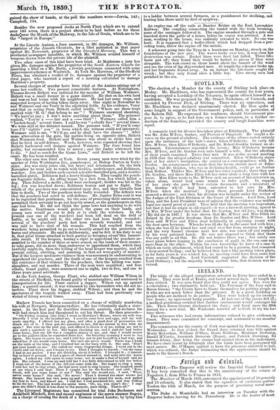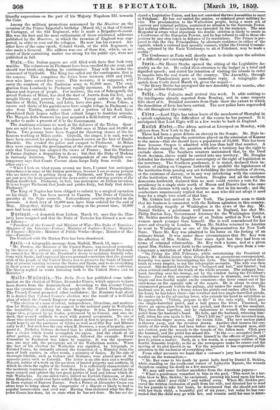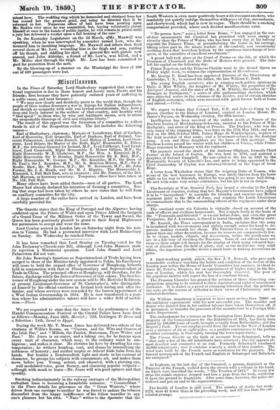fortigu ant Colonial.
I TEIIIIt.—The Emperor will review the Imperial Guard tomorrow. It has been remarked that this is the anniversary of the return of Napoleon I. from Elba to France in 1815. The Moniteur of March 16th announced the appointment of 16 generals and 13 colonels. It also stated that the squadron of evolution quitted Toulon the 15th of March, for the purpose of practising naval man-
031137136.
The Duke de Montebello had an interview on Tuesday with the Emperor before leaving for St. Petersburg. He is the bearer of most friendly expressions on the part of his Majesty Napoleon III. towards the Czar.
Among the military promotions announced by the Moniteur on the occasion of the Prince Imperial's birthday (March 16,) is that of Colonel de Castagny, of the 82d Regiment, who is made a Brigadier-General.• His was the first and the most enthusiastic of those celebrated addresses published by the Moniteur, in which the invasion of England was sug- gested, in order to root out the refugees. He now has his reward. An- other hero of the same epoch, Colonel Gault, of the 46th Regiment, is also made a General. His address was one of those few, which, on ac-' count of their containing matter too strong for the public eye, were not
published in full. •
Si 11111.—The Italian papers are still filled with facts that look very. warlike. The volunteers- in Piedmont have been enrolled for one year, and
should war break out, during its continuance. They will be under the command of Garibaldi. The King has called out the contingents, that is the reserve. This comprises the levies born between 1828 and 1833,
men who have served five years, This measure, it is supposed, will carry the numbers of the Aardinian army to 87,000 men. The emi- tion from Lombardy to Piedmont rapidly increases.. It includes all classes and degrees of people. For instance, the son of Sebregondi, the
actual Podesta of Milan, has shed the dust of Austria from his feet, and Sought liberty and poverty in Piedmont. Young cadets of the noble families of Melzi, Taverna, and Litta, have also gone. From Udine, a curate and thirty of his parishioners have sought refuge in Piedmont; so also from Trevita, another curate and a portion of his flock have abandoned their homes rather than submit longer to Austrian misrule. The Marquis della Gonzoni has just mounted a field-battery of artillery, in order to make a present of it to the Government. The Austrians continue to work at the defences of the Ticino. Quer • ters are said to have been taken for 20,000 men at Milan and 10,000 at Pavia. Two persons have been flogged for throwing stones at the la-
bourers working at Milan castle. Cruvelli, the singer, it is said, was to have been arrested for placing a tricoloured crown on the bier of Emilio
Dandolo. She evaded the police and escaped to Piedmont. At Milan they were expecting the proclamation of the state of siege. Some papers state that Tuscany has adopted the views of France ; that the Duchess
of Parma displays a disposition to do so ; but that the Duke of Modena is furiously Austrian. The Turin correspondent of one English con- temporary says that Count Cavour alone keeps Italy from revolt. An- other says—
`When I look on what passes around me here, I cannot but anticipate disturbances in some of the Italian provinces, because I see so many persons who are interested in getting them up. Piedmont, and Turin especially, are just now the head-quarters of the more active and stirring portion of the Italian disaffected. Piedmont, in fact, has undergone an Italian invasion. It is no longer Piedmont that:leads and guides Italy, but Italy that drives Piedmont."
The King of Naples has been obliged to submit to a surgical operation on his thigh. Ho has been moved to Caserta. The Duke of Calabria presides at the State councils. Extraordinary activity prevailed in the arsenals. A fresh levy of 18,000 men have been ordered for the end of May. Altogether, during the year ending at the present time, 36,000 men had been enlisted.
• ntittgal.—A despatch from Lisbon, March 16, says that the Min- istry have resigned and that the Duke of Terceira has formed a new one as follows- " President of the Council and Minister of War--The Duko of Terceira ; Minister of the Interior—Fontes ; Minister of Justice—Ferrao ; Minister of Finance—Ribeiro ; Minister of Public Works—Serpa ; Minister of Ma- rine—Ferrcira."
The Contract with Sir Morton Peto has been abandoned.
jIain.—A telegraphic message from Madrid, March 13, says-
" Mr. Preston, the Minister of the United States, was received yesterday by the Queen at a private audience. In the name of President Buchanan he assured her Majesty of the President's desire to maintain friendly rela- tions with Spain, and expressed his own personal conviction that the general wish of the people of the United States was to preserve the bonds of friend- ship at present existing between the States and Spain, and to do everything in their power to avoid any misunderstanding between the two countries. The Queen replied in terms flattering both to the United States and its Minister."
/Ilan -Vial tat 111.—The Daily News has published some infor- mation on the election of Prince Alexander Couza, which appears to have been drawn from the fountain-head. According to this account Couza was the spontaneous choice of the people in the United Principalities. The French Consul promoted other candidates ; the Russians kept aloof. It is denied that Colonel Couza's election was the result of a well-laid plan of which the French Emperor was cognizant. "The election of a man of talent, independence, liberalism, and modera- tion for Moldavia, could not but suggest to the national party in Wallachia the desirability of electing the same Hospodar. It was, however, but a vague idea, proposed by no leader, patronized by no Consul, and one, in- deed, that seemed unlikely to meet with general acceptation. No one of those who desired such a consummation dared at first to propose it ; for who could hope to see the partisans of Ghika as well as of Stir Bey and Bibeaco rally to it ? Yet such was the case when M. Boeresco, a man of no party, pro- posed it. Nicholas Golesco declared that he abdicated all pretensions be- fore a choice which would accomplish the union. And the chiefs of all other parties, even the most retrograde, followed the example. Every Consulate in Bucharest was taken by surprise. It was the spontane- ous, one may add, the precipitate act of the Wallachian nation. When the fact of his election for Wallachia was signified, by telegraph, to Colonel Couza, he instantly advised the formation of a Ministry from the men of both parties, in other words, a ministry of fusion. By the side of thorough liberals, such as Golesco and Bratiano, were placed men of the opposite party such as Catardji. The latter is an able man and a wealthy Boyard, author of a work on the question of landed property and serfdom, in which he abets the rights of the landlord. It is sufficiently characteristic of the moderate tendencies of the new Hospodar, that he thus united in the same council and cabinet the two great parties of land and labour which di- vide Wallachia. No one-sided ruler, indeed no Turkish Caimacan, or Aus- trian Hospodar, could ever have settled that question, which is the vital one in those regions of Eastern Europe. Such a Prince as Alexander Couza can alone hope to bring about the compromise of a dispute so likely to lead to popular insurrection and civil war. Having thus indicated what the Hos- podar Couza has done, let us state what he has not done. He has not de- dared a Legislative Union, and has not convoked thetwo Assemblies to meet at Fokshani. He has not united the armies, or ordained great military le- vies. The proclamation to the Wallachian people, being.a more act of courtesy and internal politicsr contained no allumon to the Suzerain Power. But nothiiig offensive or insulting was intended•by the emission. The new Hospodar is aware what objections his double election is likely to create in a Conference of the European-P.oWers, and he. has refused to add to these ob-. jections by any step taken in defiance of its resolutions. The Prince is pre- pared to rule the two Principalities by alternate residence in either of the capitals, which a railroad.rnay speedily connect, whilst the Central Commis- sion, ordained by the Paris Conference to sit at Fokshani, may be made a reality."
The Conference at Paris will shortly meet to decide upon the solution of a difficulty not contemplated by them.
I 1111i ff.Sir Henry Storks opened the sitting of the Legislative As- sembly on the 1st. He called their attention to the budget in a brief and dignified speech; and stated his intention of visiting the islands in order; to inquire into the real wants of the country. The Assembly, through President Flamburianis gave no immediate reply. A telegraphic de; spatch from Corfu dated March 10, gives the sequel-
" Sir Henry Storks has prorogued the new Assembly for six months, after ten days' useless discussion," •
5111f9.-4—The Calcutta-mail arrived this week. It adds nothing to. the intelligence already reported from Bombay, and in some respects falls short of it. Detailed accounts from Oude show the extent to which the demolition of forts has been carried. The new police have superseded the old throughout the country. ;
(1Jin H ,—Lord Elgin has taken leave of the merchants of Shanghai in a speech explaining the difficulties of the course he has pursued. It is anticipated that Lord Elgin will in a few weeks be back in England. ;
Siattg.—The Africa arrived at Liverpool on Monday, with advices from New York to the 2d.
There had been a great debate on slavery in the Senate. Mr. Hale in- troduced a bill repealing the restriction placed on the admission of Kansas to the union—that she should have a population of 93,000. This has been done because Oregon is admitted with less than half that number. A fierce debate ensued on the question whether a territory has the right to exclude slaves. The Southern senators maintained that, by the Dred Scott decision, slaves could be carried into any territory. Mr. Douglas defended his doctrine of Squatter sovereignty or the right of legislation in the terrritory. The Southern gentlemen, it is stated, declared their in- tention of calling on Congress forthwith to prohibit the legislatures of the territories from passing any act forbidding the introduction of slaves, or the existence of slavery, or in any way interfering with the existence of the institution within their borders. Douglas and all the northern democrats forthwith declared that no man could receive a vote for the presidency in a single state north of Mason and Dixon's line who came before the electors with such a doctrine as that in his mouth ; and the southerners unanimously replied that no man who did not adopt it need hope for a single vote south of that line. • Mr. Cobden had arrived in New York. The journals seem to think that his business is connected with the Reform agitation in this country. • A shocking tragedy at Washington is the news of the day. Mr. Daniel Sickles, a gentleman well blown in England, has shot Hr. Philip Burton Key, Government Attorney for the Washington district. Mr. Sickles married the daughter of an Italian settled in New York.; a woman much younger than himself. She is well remembered for her grace and vivacity in London. When Mr. Sickles returned to America he went to Washington as one of the Representatives for New York State. There Mr. Key was admitted to his home on the footing of an intimate friehd. It was under these circumstances that Mr. Key won the affection of Mrs. Sickles. Ever since April last they had been on terms of criminal relationship. Mr. Key took a house, and at a given signal Mrs. Sickles went forth to the assignation. We quote from a con- temporary a narration of what followed-
" On Friday the 25th February, while entertaining the President at dinner, Mr. Sickles learnt these details from an anonymous correspondent. Saturday was spent in investigating the facts. The inquiries proved their truth in every respect, so say the telegraphic accounts. The wife was then accused. She declared that she was "betrayed and lost," and fainted ; but when revived confessed the truth of the whole account. The unhappy hus.: band, brooding over his wrongs, sat by the window facing the President's Square. Just at this moment—the coincidence is dramatic, and were the tragic end less fearful might excite comment—the lover comes out of the club-house on the opposite side of the square. He is about to cross the ornamented grounds within the palings, and makes the usual signal. The husband sees it, and in a frenzy seizes his pistols and rushes after him. In his hurry he has taken three—one revolver and two single-barrelled pistols. He rushes up to the advancing lover, who extends his hand in salutation as he approaches. Villain, prepare to die !' is the only reply. Click goes one single-barrelled pistol, and a ball grazes the lover. Unarmed, he draws an opera-glass from 'his coat pocket, and throws it at his assailant. They then close together, and he endeavours to wrench the remaining pistol from the husband's hand. He fails, and the husband, releasing him- self, raises his arm again to fire. Don't kill me !' prays the unarmed man. The merciless finger moves, and the victim falls. The now useless pietol is thrown away, and the revolver drawn. Another shot insures the cer- tainty of the work that had been before done ; but the enraged man, still not content, puts the muzzle to the temple of the fallen man. Click goes the hammer, and the pistol has missed fire. ' Is the — scoundrel dead ?.' he says, andturning away surrenders himself to the officers of justice, and goes to prison a martyr. Such, in a few words, is a meagre outline of thie fearful domestic tragedy, so far as the newspapers make its causes and the moving of its plot known to us. For the moment it has engrossed public attention to the exclusion of everything else."
From other accounts we learn that a coroner's jury has returned this verdict on the transaction- " Mr. Key came to his death by pistol balls fired by Daniel E. Sickles, while standing on the south-east corner of Lafayette Square, the wounds therefrom causing his death in a few moments." We may add some further anecdotes from the American papers- " When a gentleman remarked to him in the gaol, 'This must be a ter- rible blow to Mrs. Blades,' he exclaimed, pressing his hand upon his brow,
Yes poor child ! poor child ! ' and walked away. When Mr. Sickles pro= cure the written confession of guilt from his wife, and directed her to send for her parents to take her home, he determined that she should not take with her their child, a beautiful girl of six years ; but today he has con- sented that the child may go with her, and remain until his case is deter-
mined here. The wedding ring which he demanded and obtained from her has caused her the greatest grief, and today he directed that it be returned to her. Numerous offers of bail have been pouring upon Mr. Sickles ever since he was committed, but, having voluntarily placed himself at once in the hands of public justice, he will remain in prison until a jury has delivered a verdict upon a full hearing of the case." In the Kentucky Legislature on the 2d March, a!Mr. Maxwell was speaking, when he was interrupted by a member named Low, who de- nounced him in insulting language. Mr. Maxwell and others then fired several shots at Mr. Low, wounding him in the thigh and arm, cutting off his thumb, and riddling his shirt. A general fire with pistols now ensued, and John Aldridge, a friend of Mr. Low's, was killed, and a Mr. Miller shot through the thigh. Mr. Low has been committed to gaol for protection from the mob. By the blowing-up of a steamer on the Mississippi the lives of 200 out of 400 passengers were lost.




































 Previous page
Previous page